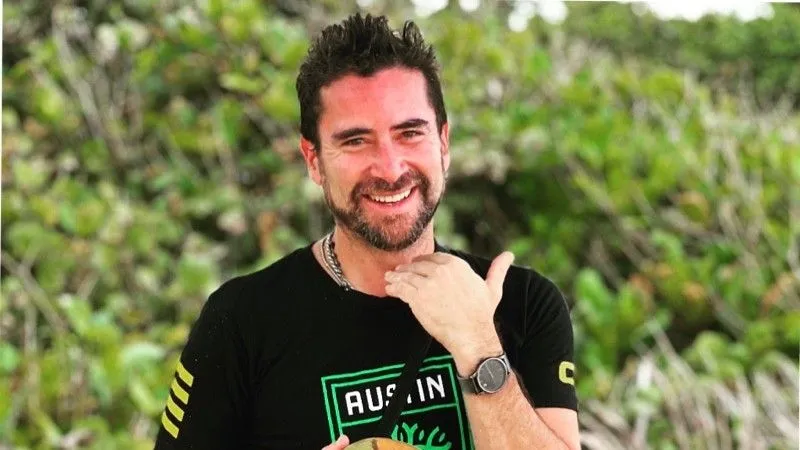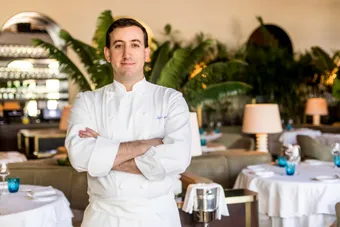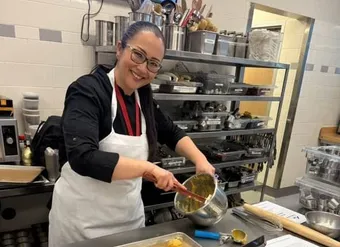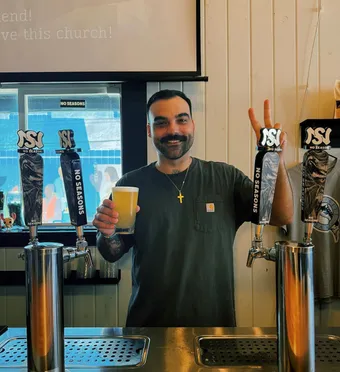Private Chef Egil Valentin has spent decades in the hospitality industry — from NYC restaurants to Le Cordon Bleu classrooms, stadium kitchens and private homes. Born in Puerto Rico, he’s done it all, from teaching to working with high-profile clients.
In this interview with OysterLink, Egil shares his background, what it truly takes to lead a kitchen, and his vision for the future of the hospitality industry.
What’s your background?
Egil: I’m Egil Valentin. I’m from Puerto Rico, and I’ve been a Chef for about 27 years. I attended the French Culinary Institute in New York City and worked in the city for 10 years, followed by about two years in Connecticut.
After that, I opened a Nuevo Latino restaurant — one of the best at the time. I ran it for the first year after opening, then moved back to New York. When September 11 happened, my ex-wife, who’s also a Chef and originally from Houston, suggested we move to Austin. So, we did.
In Austin, I started working as a Culinary Instructor at Le Cordon Bleu. I taught for several years, leading classes in protein and butchering. It was a great experience — almost like hosting a cooking show. I’d cook while students watched, asked questions and interacted with me in real time.
After the demo, they would return to their stations, reproduce what I had made and then bring me their dishes. I’d taste their food, give feedback and grade it. It was a lot of fun.
After teaching, I wanted to become a well-rounded Chef. I have always had the goal of working in various areas, including education, catering, stadiums and retail. So, I began climbing the ladder.
I became the Chef of a Japanese-Latino restaurant after my time teaching. Then, I transitioned into retail, working with Central Market, where I held the position of Executive Sous Chef.
I also got into research and development. To be specific, I worked for a company that specialized in creating unusual sausage combinations — like antelope, rattlesnake and pork. I helped develop those products.
After all that, I started thinking more seriously about returning to education somewhere down the road.
What did your role as Executive Sous Chef teach you about leadership and teamwork?
Egil: As the Executive Sous Chef, I found that strong people skills were essential in that position. You must be able to look people in the eye and make sure they’re comfortable with you. It’s all about respect and remembering “we’re a team.”
You don’t have to go around telling people you’re the Chef as they already know. What matters is being a team player.
If something goes wrong, you step in, show how it’s done and if it’s still not right, you come back and guide them again.
You also have to multitask constantly. While you’re watching for hazards and safety issues, make sure that boxes aren’t blocking anything, check the floor and oversee quality.
What was your experience like working in a stadium kitchen?
Egil: That was the hardest job of my life. When I joined, the stadium wasn’t even finished. There were just five of us building everything from scratch — menus, systems, layout — for a 22,000-seat stadium. Eventually, we became a crew of 15, and I served as the Chef de Cuisine.
We managed four restaurants, 27 VIP rooms, 37 concession stands, a main kitchen and catering. It was a monster. Each Chef took charge of a section, and on game days, we’d bring in 50 to 70 temps to cover the volume.
That Chef job taught me the value of extreme organization and precision, particularly in a mindset where things can go wrong quickly.
I was constantly troubleshooting and ensuring that VIPs were taken care of, food was being distributed correctly and everything stayed on track.
We started prep four days before each game, working from 8:00 a.m. to 2:00 a.m. I barely saw my kids. After the first season, I decided to step away. It just wasn’t a sustainable life.
How did you get into Private Chef work, and what’s that experience like?
Egil: I’d done Private Chef work before and even tried launching a catering company with my ex-wife. It didn’t go as planned, but I had experience with high-profile clients.
Private Cheffing is completely different. You’re in someone’s home — it’s personal. You have to know when to talk, when to stay quiet and how to behave. It’s intimate. You’ll hear things you shouldn’t, which is why NDAs are standard.
Your main job is to please. The fridge should always be full. If they want a snack or a five-course dinner, you’re ready. It’s about excellent service and knowing how to read people.
You also need to be cultured. Many of our clients are actors, executives or extremely wealthy individuals. You need to know how to carry yourself in any room. In a way, you become a “super Chef” — someone who’s not just great at food but great with people.
What did you learn from working in education?
Egil: Working in education felt like learning how to be a Chef all over again. The structure, the regulations — it’s a whole different world from restaurants. I had to find my way in, adapt and learn fast.
At one point, I was managing 14 culinary schools, each with its own distinct teams and challenges. That taught me a lot about leadership and people skills. To me, a leader leads by example. If your staff doesn’t see you doing the work, they won’t follow.
I made it a point to know people’s names, to connect. “Hey Maria, how’s Jose?” Small things like that matter. Then, I’d move into the operations side — troubleshooting, checking inventory, food safety and quality assurance.
It was complex, but once you understand how everything works together, you realize the value of that experience. Education gave me a new perspective on what it really means to lead and to teach.
Do you think going to culinary school is necessary to succeed in the restaurant industry?
Egil: That’s a really good question. I’d probably answer it differently now. I went to culinary school because my grandmother was a Chef, and back then, that’s what you did.
However, I have many friends who made it from the bottom without attending school. They started as Dishwashers or volunteered to learn on the job. It’s possible — it’s just a harder path sometimes.
The difference is that culinary school doesn’t teach you how to hustle or have thick skin. That comes from being in a real kitchen.
If you ask me today whether you need culinary school, I’d probably say no. Schools cost around $45,000 now, and when you graduate, you’re lucky to make $35,000 a year. So, it’s hard to justify the debt.
You can learn techniques in school, but you can also learn them for free in restaurants — plus the tricks and attitudes they don’t teach in class.
What I did, and what many people do, is work while in school. I worked for free at Michelin-starred restaurants just to be in the environment. That’s how I really learned.
If a young person told you they wanted a career in hospitality, what path would you recommend?
Egil: Well, if it’s about being a Chef, it’s a very tough path. You have to start from the bottom, and you’ve got to be ready.
The main thing is, if you’re in it for the money, you’re in the wrong business.
The money comes later — after you’ve paid your dues. If you decide to be a Chef, you need to build a strong resume from the start.
If you’re going to work, work in good restaurants. Work hard, then move on to the next. I think the key is determination. You have to be resilient.
It’s a tough business — when people are having a great time and sipping champagne, you’re the one working. There’s no Mother’s Day, no Christmas, no breaks.
You have to be committed to making significant sacrifices. But if you love to cook, the satisfaction of creating something from raw ingredients into something beautiful — that’s what a Chef, or any artist, lives for.
You’re selling dreams. You’re selling memories. Just knowing that people take that experience with them — that’s the reward.
You’ve got to decide: Do you want this path, or do you want hotel management, sitting at a desk in front of a computer? Or do you have the guts to get up, grab your knife and get into the kitchen?
And don’t think that just because you want to be a Chef, you’ll be calling the shots right away. That’s completely wrong.
It took me years. When I was in New York, I led a very challenging life. I was eating pasta with parsley and butter — I had no money at all. But I had the passion, and I knew where I was going. I knew that wouldn’t be my life forever.
Why do you think there’s so much turnover in the restaurant industry?
Egil: Well, it happens. One of the biggest issues is that there isn't a genuine people culture at many restaurants.
If you treat people poorly, no one wants to work for you.
It’s about creating a space where people feel comfortable, where they’re not just thinking about the money. They come in, they enjoy what they do and they’re nourished in that way.
After September 11, things shifted — it became all about people skills. Because if you don’t have that, your cook’s going to leave for a dollar more next door. You have to really know how to handle that part, which isn’t easy.
You need the awareness to know what’s right and wrong, what’s a priority and what’s not and how not to put people in situations where they feel dumb or unsure.
You need to know how to approach someone, like: “Hey, this looks great, but what if we tried it this way?” You work around it — you make them feel like they’re part of the decision, even if you already know the answer.
That’s how you build connections. That’s how you keep people. Retention these days is incredibly difficult.
Additionally, the cost of living is a significant issue. Cooks don’t make much money, and in places like Austin, it’s extremely expensive.
Many people have to work two jobs just to make ends meet. If you want to live well here, you’ve got to make six figures — and most Cooks don’t come close.
What does it take to build a team that stays?
Egil: You have to know how to handle people. And that’s not easy. You need to understand what’s right and wrong, what’s a priority and how not to make someone feel dumb if they don’t know something.
Let’s say you see someone doing something wrong. Instead of saying, “That’s wrong,” you go, “Hey, this looks great, but what if we tried doing it this way?”
Even if I already know the answer, I’ll present it like it’s a shared idea. That way, the person feels a sense of involvement in the process. You make them part of the decision-making, and they feel like they belong.
Do you think there’s also a gap between front of house and back of house?
Egil: Yeah, definitely. In a lot of places, it’s like the front is the front, and the back is the back. It becomes one against the other. But if you can figure out how to blend both, that’s when things work.
That’s when you’re successful. That’s when you win stars. When everyone becomes one team, that’s when you grow, when you flourish.
Do you think abusive environments in the kitchen have changed over the years?
Egil: When I was in New York, yeah, sometimes they’d hit you in the head — not hard, but still. You can’t do that now. You’d get into serious trouble. You have to respect not just what people do, but what you say. It can come back to hurt you, especially if the place is unionized.
You have to treat people carefully now — watch your tone, your words. That’s not a bad thing. That’s just where we are now. Some Chefs still scream, and honestly, I like that. That energy, that push — that’s my adrenaline. I like when the Chef is calling out, and you’re calling back. It’s like a dance. It’s beautiful.
But not everyone feels that way. Some people take it personally or get offended.
You’ve got to understand who you’re working with and how they respond, as what motivates one person might push another away.
What do you think is the future of the industry? Some people say Gen Z isn’t as hardworking as past generations — do you see that too?
Egil: Yeah, I agree. The industry has definitely changed. This new generation brings in all these new techniques — molecular gastronomy, thumbs here, thumbs there — but a lot of it is just for looks.
They don’t always go by flavor anymore. If I go to a restaurant, I want a steak. I don’t want half foam, half steak.
Don’t get me wrong — I think those techniques are great when they’re used to enhance a dish, to make something fun where you’re like, “My God, what is that?” But they shouldn’t be the main thing. I also think this generation takes a lot of shortcuts.
To really get the best out of them, you have to micromanage. There’s a loss of pride in being a Chef, in what it means. Back then, there was so much respect for the Chef. The Chef was everything. Now, that respect isn’t there in the same way.
I think we’re moving toward more capitalism in the industry. You’ve got restaurant groups popping up everywhere. Some of these younger people have money. They create a new concept and boom — it takes off.
Especially here in Austin, a 30-year-old will open a super trendy place next to a classic restaurant that’s been around for decades, and that old place gets crushed. It happens all the time.
It’s hard for our generation because we’ve seen where it was and where it’s going. But I think we’re moving toward plant based. That’s going to be the next big thing. Vegetables are going to be the stars. You already see it happening.
And I love vegetables. That’s kind of my thing — taking vegetables and turning them into something really delicious, something you’ve never tried before.
I think we’re moving toward that even more now because prices for steak, fish, all of that — it’s just too high. So, you’ll start seeing more farm-to-table, more plant-based dishes.
And I think we’ll see Chefs and Bartenders blending worlds too — bringing vegetables into the mixology space, creating full sensory experiences. There’s a lot that can be done. It could be really fun.
What advice would you give to someone who wants to become a Chef?
Egil: More than anything — don’t give up.
There are going to be moments when you feel like running away or screaming. But those are the exact moments when you need to hold on, put your shit together, grab your knife and show up with a good attitude.
Things will get better, and you will get better. So have faith, and, more than anything, have faith.
The Heart and Hustle Behind the Chef’s Journey
Success in the culinary world isn’t about titles or shortcuts — it’s about showing up, respecting your team and staying committed even when it gets tough.
From building stadium kitchens to shaping future Chefs, Egil Valentin reminds us that resilience, people skills and a passion for honest food are what truly carry you forward.
Want to get articles like this straight to your email? Make sure to create an OysterLink account and join our newsletter.




